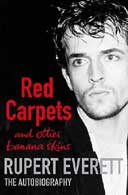
Red Carpets and Banana Skins
by Rupert Everett
Little, Brown £18.99, pp416
In one episode from Rupert Everett's memoir, the author and a friend stay up all night brainstorming. They are supposed to be coming up with ideas to fix the script to a doomed film Everett is making. They have an appointment the following morning to see Madonna, the movie's co-star. They turn up late, with no sleep and no big idea. Madonna is practising yoga. As the pop diva assumes ever more elaborate bodily contortions, her guests doze off in the corner.
This, presumably, is one of the slip-ups referred to in the book's title, which implies a slapstick romp through the world of showbiz celebrity. Up to a point, that's what the book is. But the title is disingenuous. Whereas banana skins turn up by accident, Everett's periodic career skids are self-inflicted. He might, for example, have had more luck brainstorming on the script if he hadn't invited a third party to the session - his drug dealer. Likewise, decades earlier, he might not have been expelled from drama school if he hadn't been out all night, every night, cruising west London looking for a party. But he prefers to blame the inverted snobbery of 1970s proletarian theatre culture that took against his poshness and only gave him uninspiring roles. It was never like that at Ampleforth, where young Rupert wowed pupils and parents with his mesmeric portrayal of Titania.
No matter. After a brief spell slumming it in a freebie apartment in Chelsea, Everett's stage career takes off. Soon, he is in the West End taking the lead in Another Country. After that, his progress is, roughly speaking, as follows: some more theatre, a few very successful films, a lot of celebrity parties and shared lavatory cubicles, some less successful films, a spectacularly hopeless attempt to be a pop star, a voiceover part in Shrek 2.
My summary may not be chronologically coherent, but neither is Red Carpets and Other Banana Skins. That isn't exclusively Everett's fault. His opus badly needed an editor, which is not a lot to expect in the world of modern publishing but appears to have been too much in this case. Had a professional eye been cast over the proofs, it might have identified the many repetitions and inconsistencies. It might also have spotted those moments when the author lapses into writing so lazy it might almost be parody. 'Those were the days!' Everett says of a holiday. 'You could have knocked her down with a feather,' he says to describe someone's astonishment. Really, Rupert? With a feather!
He is also capable of veering off to the other extreme, overwriting his prose with romantic flights of natural fancy. 'Wind wailed around the school,' when he arrived at Ampleforth. 'Rooks cawed in the woods, and the low, heavy boom of the abbey bells could be heard far away on the moor.'
While the movie sets and celebrity encounters are described with self-deprecating irony and the odd elegant phrase, Everett's childhood is recalled with cloying nostalgia and delusions of literary grandeur. Imagine Tolstoy's accounts of growing up in a rarefied world of wealth and privilege, but with luvvie self-obsession in place of profound introspection and My Best Friend's Wedding as the narrator's creative destiny instead of Anna Karenina. That doesn't make for an uninteresting read. Everett has led a colourful life. He is, by his own admission, an inveterate fibber, so some of his tales may be tall, but the names he drops are real. There are photos to prove it: Rupert with Madonna, Rupert with Gianni Versace, Rupert with Kate Moss. It is a shame the book has no index from which a gossip-hungry reader might cherry-pick the juicier berries of celebrity scandal.
But it is Everett's adventures away from the beau monde that are genuinely engaging. His affection for the seedier side of the Bois de Boulogne in Paris, his adventures on the gay scene of Soho in the Eighties, Chelsea in the Seventies and boarding school in the Sixties - all are told with bounderish exuberance and a hint of self-awareness. Sadly, the safety net of independent wealth that protects Everett through these high-wire adventures is also his handicap. He attacks everything, including writing his memoir, with the zeal of a dilettantish aristocrat, full of energy and self-belief, bereft of responsibility and commitment, a Toad of Toad Hall on stage and on drugs.

